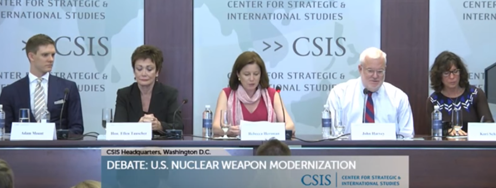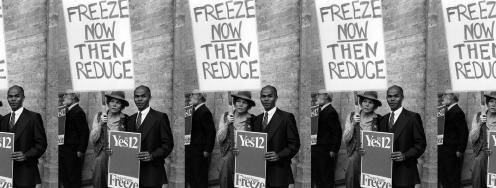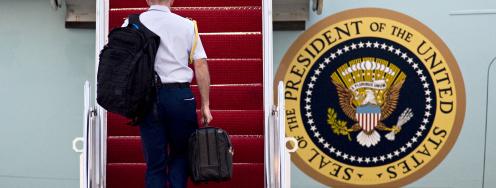One Year Later, the Iran Deal Is Working
On the radar: JCPOA turns one; Get rid of the nuclear button; Appraising China’s nuclear forces; and Obama should end high-alert
Evaluating the Iran Deal - “One year later, the nuclear deal between Iran and the major powers is working. It has substantially restricted Iran’s ability to produce fissile material, the key ingredient for a nuclear bomb, and in that way has made the world safer,” writes the editorial board of The New York Times.
--“There are clouds on the horizon that raise doubts about whether the nuclear deal can be sustained. Those include growing tensions between Shiite-majority Iran and Sunni-majority Saudi Arabia, concerns in Washington about Iran’s destabilizing activities in the region, and elections in the United States this year and in Iran in 2017 that could strengthen the forces eager to upend the agreement.” Full article here. http://nyti.ms/29gBynD
Fixing the nuclear monarchy - “It’s time to get rid of the nuclear button,” writes Ploughshares Fund Director of Policy Tom Collina for Defense One. “Once the president issues orders, the well-oiled military machine takes over. The orders travel down the chain of command until they reach launch officers in missiles silos and on submarines, who have trained for this moment. Only widespread mutiny could stop this process from reaching its grim end.”
-- “But it does not have to be this way. It would be better if the president took more time to assess the situation, to make sure a perceived attack was real and not a false alarm.” Full piece here. http://bit.ly/29gsDmy
See also - “U.S. can't ignore rising nuclear danger,” by Nicholas Roth for CNN. http://cnn.it/29r9pNN
New Chinese stockpile numbers - “Although there is no sign that the Chinese government has officially diverted from its nuclear policy – which includes a pledge not to use nuclear weapons first, not to use them against non-nuclear countries or in nuclear-weapon-free zones, and to maintain a minimum deterrent designed only to ensure a survivable second-strike capability – its modernization program is adding significant new capabilities. These qualitative improvements may in turn alter Chinese nuclear policy and strategy,” write Hans Kristensen and Robert Norris in a new report for the Bulletin of the Atomic Scientists.
--“We estimate that China has a stockpile of approximately 260 nuclear warheads for delivery by nearly 150 land-based ballistic missiles, 48 sea-based ballistic missiles, and bombers. This stockpile is likely to grow further over the next decade as new nuclear-capable missiles become operational.” Read the full report here. http://bit.ly/29eeAfQ
Tweet - @ArmsControlNow: Twenty years ago this week, the International Court of Justice issued an advisory opinion regarding nuclear weapons. http://huff.to/29tW5tE
President should end hair-trigger - “Today, both the United States and Russia keep hundreds of nuclear missiles on high alert, so they can be launched within minutes if an early warning system detected an attack… Keeping missiles on hair-trigger alert opens the door to a mistaken launch in response to a false warning of an incoming attack. It also increases the risk that one or more nuclear-armed missiles could be launched accidentally or without authorization,” write Steven Weinberg and Lisbeth Gronlund for The Plain Dealer.
--“President Obama understands the risks inherent in the current U.S. policy. On the campaign trail in 2008, he noted that ‘keeping nuclear weapons ready to launch on a moment's notice is a dangerous relic of the Cold War. Such policies increase the risk of catastrophic accidents or miscalculation.’ As commander-in-chief, the president has the authority to take these weapons off high alert. Doing so would have profound security benefits for all Americans—and the rest of the world—by reducing the risk of nuclear disaster.” Full article here. http://bit.ly/29mMX6N
Tweet - @KelseyDav: Good points on need for updating #MTCR in @BulletinAtomic How to revitalize missile nonproliferation https://t.co/Y9ltuHN0Db
Don’t miss the Timbie Forum - Make sure to attend this year’s James Timbie Forum on Arms Control and Nonproliferation on July 14 and 15. The event’s first day will feature Kelsey Davenport of the Arms Control Association, Smitri Keshari, Director of “the bomb,” and others. The second day will feature Colin Kahl, National Security Advisor to Vice President Biden, David Sanger of The New York Times and others. Register here. http://bit.ly/28Mit1u
Quick Hits:
--“AP Interview: Jordan eager to reach nuke deal with US,” by Karin Laub for the AP. http://apne.ws/29e4HQE
--“The battle continues, 50 years after first test at Mururoa,” by Jamie Tahana and Lucy Smith for Radio New Zealand. http://bit.ly/29foSwX
--“If Terrorists Got Hold of a Nuclear Weapon: The Stuff of Nightmares,” from The Economist. http://bit.ly/29dSUFy
Events:
--“Nuclear Policy for the Next Administration,” with Christopher Peble, Cato Institute; Kelsey Davenport, Arms Control Association; Steven Pifer, Brookings Institute; and moderated by Joseph Cirincione, Ploughshares Fund. July 6 at 6:00 p.m. at the American Foreign Service Association, 2010 E St. NW, Washington. http://bit.ly/1ZOcqs3
--“Worth Deferring: A Sino-Japanese Plutonium Production Race,” with Gordon Oehler, former director of CIA Nonproliferation Center; Henry Sokolski, Nonproliferation Policy Education Center; and Mark Holt, Congressional Research Service. July 11 from 11:30 a.m. to 1:15 p.m. at the Capitol Visitor's Center, SVC 203-02, Washington. Sponsored by Arms Control Association and Foreign Policy Initiative. RSVP online. http://bit.ly/29majK6
--“Nuclear Proliferation Success and Failure: Iran and North Korea webinar,” Mark Fitzpatrick, International Institute for Strategic Studies. July 14 from 10:00-11:00 a.m. BST, RSVP online. http://bit.ly/2978mP9
--“Senate Perspectives on Nuclear Deterrence, Arms Control and Proliferation,” featuring Sen. Joe Donnelly (D-IN). July 12 at 8:00 a.m. at the Capitol Hill Club, 300 First St. SE, Washington. Part of the Huessy Congressional Breakfast Seminar Series. RSVP online. http://conta.cc/25ULZFH
--The James Timbie Forum for Arms Control and Nonproliferation. At the State Department (July 14) and George Washington University (July 15). Register here. http://bit.ly/28Mit1u



